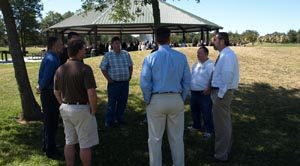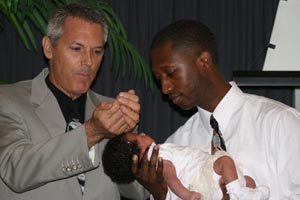What does “Reformed” mean?
The Reformers were men in the fifteenth and sixteenth centuries who wanted to recover biblical teaching and theology in the midst of Roman Catholicism. Their original hope was to reform Catholicism, but when they were excommunicated they became known as those who protested against the corrupted teachings of Catholicism, i.e. Protestants.
When we use the term “Reformed” we mean to say that the doctrine of CVP is closely aligned to the doctrine of these Reformers. The very things that they struggled to recover – the sovereignty of God, salvation by grace alone through faith alone, all for God’s glory alone – are the same things we champion. It is important to note, however, that we prefer the term “biblical.” Because we think that the theology of the Reformers is in many areas more biblical than the theology of the modern American church, we often use the term “Reformed” to distinguish ourselves from mainstream Dispensationalism. However, at the end of the day we don’t want to be known as followers of Calvin or Luther or Knox, but followers of Christ.
Click here for a more comprehensive teaching of the doctrine of Election
Why do you call CVP a “confessional” church?
 The term “confessional” refers to the fact that we believe it is important to recognize that we are part of the historic Church. Many godly men and women have lived before us who struggled in their own generations against various false teachings and practices. Over time, particularly in eras of great persecution or struggle, the Church gathered together to form Confessions – systematic summaries of the faith. These were meant to both provide accountability for the local church and to provide for everyone a clear, understandable statement of faith. While we ascribe to such Confessions as the Nicene Confession and Apostles’ Creed, we believe that the Westminster Confession of Faith is the most accurate and complete statement of faith that the Church has yet created. Even so, we do not believe that any Confession or other work of man carries the authority of Scripture.
The term “confessional” refers to the fact that we believe it is important to recognize that we are part of the historic Church. Many godly men and women have lived before us who struggled in their own generations against various false teachings and practices. Over time, particularly in eras of great persecution or struggle, the Church gathered together to form Confessions – systematic summaries of the faith. These were meant to both provide accountability for the local church and to provide for everyone a clear, understandable statement of faith. While we ascribe to such Confessions as the Nicene Confession and Apostles’ Creed, we believe that the Westminster Confession of Faith is the most accurate and complete statement of faith that the Church has yet created. Even so, we do not believe that any Confession or other work of man carries the authority of Scripture.
Click here for a link to the Westminster Standards
What does “Presbyterian” mean?

“Presbyterian” is taken from the Greek word “presbuteros” meaning “Elder.” It is a form of church government in which the collective body of Elders within a geographic region form a Presbytery to help oversee member churches. While each local church is governed by its own Session of Elders, matters of doctrine and the ordination of new Elders are referred to the Presbytery. This is believed to be the most accurate reflection of the early church as seen in Acts 15. In that passage, before the entire body of Elders, Paul gave account of his teaching at Antioch. This group then gave Paul direction for his continued ministry.
What does “Family-Integrated” mean?
 The term “family-integrated” simply refers to the fact that children are integrated with the adults in the programs of CVP rather than segregated by age groups into Sunday School classes and youth groups. The emphasis on families worshiping as families naturally results in more focused and frequent teaching on the role of the family vis a vis the Church as well as the roles within the family. Thus, at CVP there is a great effort made to teach men to actively lead and shepherd their families, to teach women to be helpmeets to their husbands, and to teach children to honor and obey their parents.
The term “family-integrated” simply refers to the fact that children are integrated with the adults in the programs of CVP rather than segregated by age groups into Sunday School classes and youth groups. The emphasis on families worshiping as families naturally results in more focused and frequent teaching on the role of the family vis a vis the Church as well as the roles within the family. Thus, at CVP there is a great effort made to teach men to actively lead and shepherd their families, to teach women to be helpmeets to their husbands, and to teach children to honor and obey their parents.
Why are infant children baptized at CVP?
 Our church baptizes the children of believers because we believe the Scriptures direct us to do so. This practice is not derived from Roman Catholicism. Rather, Roman Catholicism corrupts what was originally the historic practice of the Church. We do not believe that baptism eternally saves children or erases original sin (as does Catholicism). Rather, we believe that Jesus instituted baptism to replace circumcision. Just as the eight-day-old children of believing Israelites were circumcised, so do we baptize the infant children of believers.
Our church baptizes the children of believers because we believe the Scriptures direct us to do so. This practice is not derived from Roman Catholicism. Rather, Roman Catholicism corrupts what was originally the historic practice of the Church. We do not believe that baptism eternally saves children or erases original sin (as does Catholicism). Rather, we believe that Jesus instituted baptism to replace circumcision. Just as the eight-day-old children of believing Israelites were circumcised, so do we baptize the infant children of believers.
Click here if you want more detailed information about the practice of Covenantal Baptism
Why do some women wear headcoverings at CVP?
Some women wear headcoverings because of their family’s conviction regarding 1 Corinthians 11:2-16. In this passage Paul directs the women of the Corinthian church to cover their heads while praying and prophesying. This subject is a liberty at CVP, although it is hoped that each family will carefully study 1 Corinthians 11.
Why do some baptized children at CVP partake of the Lord’s Supper even if they haven’t yet given a profession of faith?
 We allow baptized children to participate in the Lord’s Supper because we believe that such children are members of the Church and the Lord’s Supper is the Church’s covenant meal. We see a parallel not only with many of the arguments for covenantal baptism, but also with the participation of Israelite children in the Passover. Even so, we acknowledge that for the last eight hundred years, a majority within the Church has taught that 1 Corinthians 11 requires self-examination prior to participation in Communion. Given the difficulty of the subject and the strong arguments of both positions, we allow families of CVP the liberty to determine if their baptized children will participate prior to professing faith.
We allow baptized children to participate in the Lord’s Supper because we believe that such children are members of the Church and the Lord’s Supper is the Church’s covenant meal. We see a parallel not only with many of the arguments for covenantal baptism, but also with the participation of Israelite children in the Passover. Even so, we acknowledge that for the last eight hundred years, a majority within the Church has taught that 1 Corinthians 11 requires self-examination prior to participation in Communion. Given the difficulty of the subject and the strong arguments of both positions, we allow families of CVP the liberty to determine if their baptized children will participate prior to professing faith.
Click here if you want more detailed information about the practice of covenantal communion
Why does the music at CVP include a mix of psalms, hymns and contemporary songs?
 We believe that the debate in the modern church over worship style, particularly over music, is due to the widespread belief that worship is purely an individualistic and preference-based medium. It is, so say many, solely a form of self-expression. With regard to music, you’ll find some individuals in the church that never move their mouths during singing because either they don’t like to sing or they feel that they can’t sing. Others can be heard over everyone else in the room because they believe they can sing and want to prove that point. The perspective of both groups is the same – music is somehow relative to the individual. I like to sing; I don’t like to sing. Because all that matters is my self-expression, I can sing however I want.
We believe that the debate in the modern church over worship style, particularly over music, is due to the widespread belief that worship is purely an individualistic and preference-based medium. It is, so say many, solely a form of self-expression. With regard to music, you’ll find some individuals in the church that never move their mouths during singing because either they don’t like to sing or they feel that they can’t sing. Others can be heard over everyone else in the room because they believe they can sing and want to prove that point. The perspective of both groups is the same – music is somehow relative to the individual. I like to sing; I don’t like to sing. Because all that matters is my self-expression, I can sing however I want.
In Ephesians and Colossians Paul tells us to admonish and teach one another through song. He doesn’t offer music as a medium of self-expression, but rather teaches that singing among other believers is the way we submit to and edify one another in the Body of Christ. We demonstrate our maturity as Christians when we are bound together by love, ruled by peace, and the Word of Christ richly dwells within us, leading us to admonish and teach one another through song.
Because music actually plays such an important role in worship, our desire at CVP is to move away from asking what type of music pleases me, the individual, and ask instead what type of music pleases God. Thus, our hope at CVP is to sing music that faithfully adheres to the Scriptures both in theological accuracy and content, following the patterns of music in Scripture established in the Psalms and other passages.
Regarding instruments and a music team, we are not opposed to multiple instruments in worship. However, we do believe that the purpose of worship leading is to facilitate worship. Too many times music teams end up being performance groups who actually distract from worship either by lack of musicianship or excessive showmanship. As God brings us godly, mature, and skilled musicians, and where we think they will benefit the leading of worship, we will use them during the service.
Click here if you want more detailed information about our music and worship.
Is it necessary for me at some point to become a member of CVP?
We believe that those who have decided to make CVP their home church should join its membership. We live today in a consumer-based society where the average American “shops” for the church that best matches his or her tastes. When the product doesn’t quite live up to expected standards, it is replaced with the product down the street. Membership, by committing the member and church to one another, counters this mentality. When an individual or family joins CVP, they covenant to submit to the church’s leadership and to contribute meaningfully as a member of the Body of Christ. Thus, membership has two good and necessary consequences: 1) it helps discourage the mindset of “I’m just an attendee and therefore I’m not accountable to the Church;” and 2) it helps people understand that they have a vital role to play in the ministry of the local body of believers.
